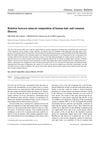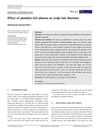 17 citations,
May 2018 in “Journal of Cosmetic Dermatology”
17 citations,
May 2018 in “Journal of Cosmetic Dermatology” Most women in the study lost hair due to chronic shedding, with stress and nutrient deficiencies being common factors.
 17 citations,
November 2013 in “American Journal of Primatology”
17 citations,
November 2013 in “American Journal of Primatology” Different monkey species in a lab showed varying levels of hair loss due to factors like type, sex, age, season, and living conditions.
 16 citations,
April 2012 in “Journal of mammalogy”
16 citations,
April 2012 in “Journal of mammalogy” Young female Australian fur seals are losing hair due to low tyrosine and zinc levels and high pollution exposure.
 15 citations,
November 2015 in “Dermatology Research and Practice”
15 citations,
November 2015 in “Dermatology Research and Practice” No clear link between hair loss and metabolic syndrome, but some differences in blood pressure and glucose levels.
 15 citations,
February 2014 in “BMC Research Notes”
15 citations,
February 2014 in “BMC Research Notes” The X5 Hairlaser might help treat male hair loss, but more research is needed.
 13 citations,
September 2016 in “Acta Médica Portuguesa”
13 citations,
September 2016 in “Acta Médica Portuguesa” Many adults in Porto have acne, but few know or treat it.
 13 citations,
February 2016 in “Clinical Medicine”
13 citations,
February 2016 in “Clinical Medicine” The document concludes that diagnosing and treating hair loss is complex and requires understanding its psychological effects and underlying causes, while also calling for more research and new treatments.
 13 citations,
June 2015 in “International Journal of Dermatology”
13 citations,
June 2015 in “International Journal of Dermatology” Non-obese women with hair loss have higher heart disease risk.
 12 citations,
January 2013 in “Alcohol and Alcoholism”
12 citations,
January 2013 in “Alcohol and Alcoholism” Alcohol in teen years leads to more adult drinking, finasteride doesn't help.
 11 citations,
July 2019 in “The Journal of Sexual Medicine”
11 citations,
July 2019 in “The Journal of Sexual Medicine” Spironolactone might cause painful intercourse and decreased sexual arousal in women.
 11 citations,
September 2012 in “Chinese science bulletin/Chinese Science Bulletin”
11 citations,
September 2012 in “Chinese science bulletin/Chinese Science Bulletin” Hair mineral content can help diagnose certain common illnesses.
 10 citations,
December 2019 in “in Vivo”
10 citations,
December 2019 in “in Vivo” Testosterone makes the connections in the uterus lining simpler and lowers certain protein levels, which might lead to infertility.
 10 citations,
January 2012 in “International Journal of Trichology”
10 citations,
January 2012 in “International Journal of Trichology” The study found no link between anxiety, vitamin B12, folate, TSH, ferritin, zinc levels, and trichodynia in telogen alopecia patients.
 9 citations,
January 2015 in “Skin appendage disorders”
9 citations,
January 2015 in “Skin appendage disorders” The article suggests that the belief in common postpartum hair loss lacks sufficient evidence and may be overestimated.
 9 citations,
October 2013 in “PLOS ONE”
9 citations,
October 2013 in “PLOS ONE” Dutasteride works better than finasteride for preventing and treating prostate cancer.
 9 citations,
March 2001 in “Clinics in dermatology”
9 citations,
March 2001 in “Clinics in dermatology” Hirsutism in women is often due to hormone sensitivity and has significant psychological effects.
 9 citations,
January 1997 in “Gynecological Endocrinology”
9 citations,
January 1997 in “Gynecological Endocrinology” The document concludes that treating androgen excess needs patience, managing expectations is important, and many drugs used are not officially approved, suggesting cosmetic options for mild cases.
 8 citations,
June 2016 in “Clinical Chemistry”
8 citations,
June 2016 in “Clinical Chemistry” PSA levels could help detect illegal steroid use in female athletes but face challenges like cost and PCOS prevalence.
 8 citations,
September 2011 in “European Journal of Dermatology”
8 citations,
September 2011 in “European Journal of Dermatology” Most treatments for Frontal Fibrosing Alopecia are ineffective, but early anti-inflammatory therapy may help and the condition may stabilize over time.
 8 citations,
October 1996 in “JAMA”
8 citations,
October 1996 in “JAMA” The document suggests a young mother use effective contraception like the Copper-T IUD while considering her health and the need for STD prevention.
 7 citations,
December 2020 in “Dermatologic Therapy”
7 citations,
December 2020 in “Dermatologic Therapy” Injections with 0.5% minoxidil effectively treat female hair loss, increasing hair density and thickness.
 7 citations,
January 2019 in “Pharmaceutical Biology”
7 citations,
January 2019 in “Pharmaceutical Biology” Eclipta prostrata helps hair growth and maintains the growth phase by affecting certain growth factors.
 7 citations,
February 2018 in “Australian Prescriber”
7 citations,
February 2018 in “Australian Prescriber” Some sports supplements can cause health issues like mood swings, hair loss, and heart problems in men.
 6 citations,
August 2018 in “BMJ open sport and exercise medicine”
6 citations,
August 2018 in “BMJ open sport and exercise medicine” Resistance training might help with PCOS symptoms, but more research is needed.
 6 citations,
April 2017 in “Journal of Dermatological Science”
6 citations,
April 2017 in “Journal of Dermatological Science” Ovariectomized mice mimic postmenopausal hair loss, and estradiol helps maintain hair density.
 5 citations,
February 2011 in “General and Comparative Endocrinology”
5 citations,
February 2011 in “General and Comparative Endocrinology” Flutamide and finasteride reduced sex hormones in pregnant hyenas, but increased them in males.
 4 citations,
December 2021 in “Archivio italiano di urologia andrologia”
4 citations,
December 2021 in “Archivio italiano di urologia andrologia” Certain drugs, especially antiandrogens and spironolactone, significantly increase the risk of gynecomastia.
 4 citations,
November 2021 in “Frontiers in endocrinology”
4 citations,
November 2021 in “Frontiers in endocrinology” Children and adults with Cushing's disease show different symptoms and males have more severe cases; surgery outcomes can be predicted by certain factors.
 4 citations,
February 2018 in “Journal of Cosmetic Dermatology”
4 citations,
February 2018 in “Journal of Cosmetic Dermatology” Platelet-rich plasma injections made hair thicker for both men and women, with a greater effect in women.
 4 citations,
January 2012 in “Journal of the Egyptian Women's Dermatologic Society (Print)”
4 citations,
January 2012 in “Journal of the Egyptian Women's Dermatologic Society (Print)” Women with female pattern hair loss may have a higher risk of developing metabolic syndrome.






























